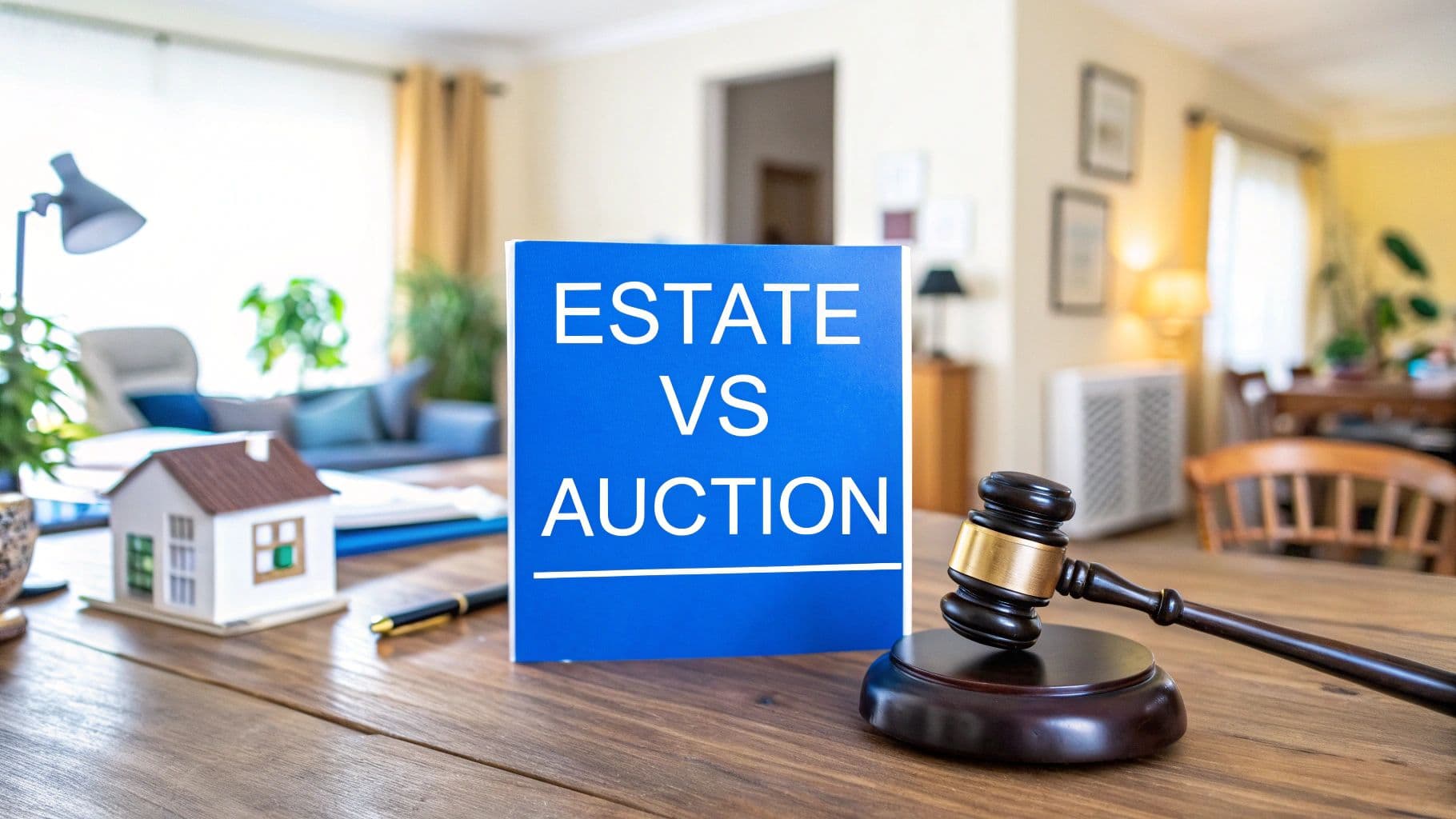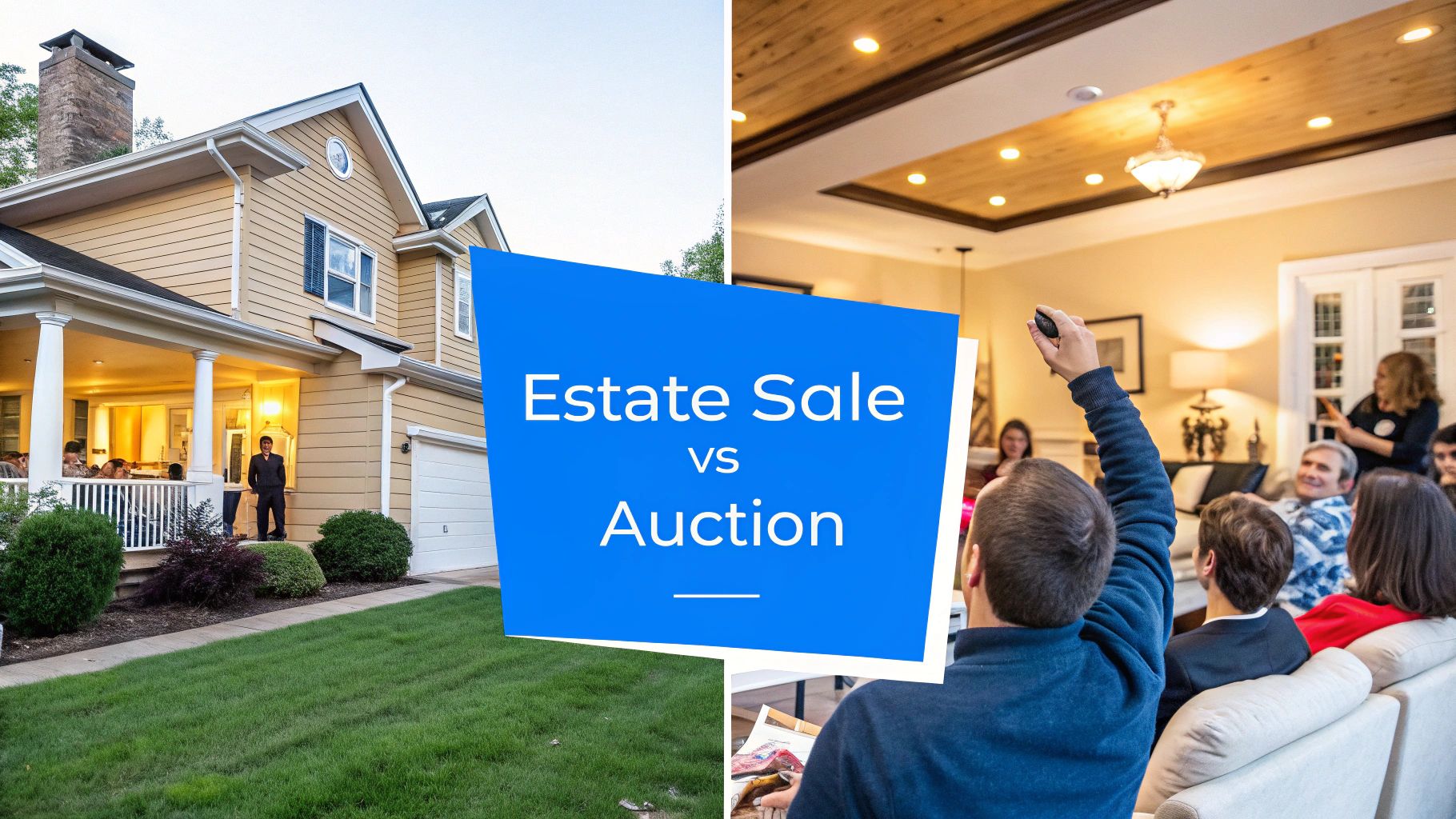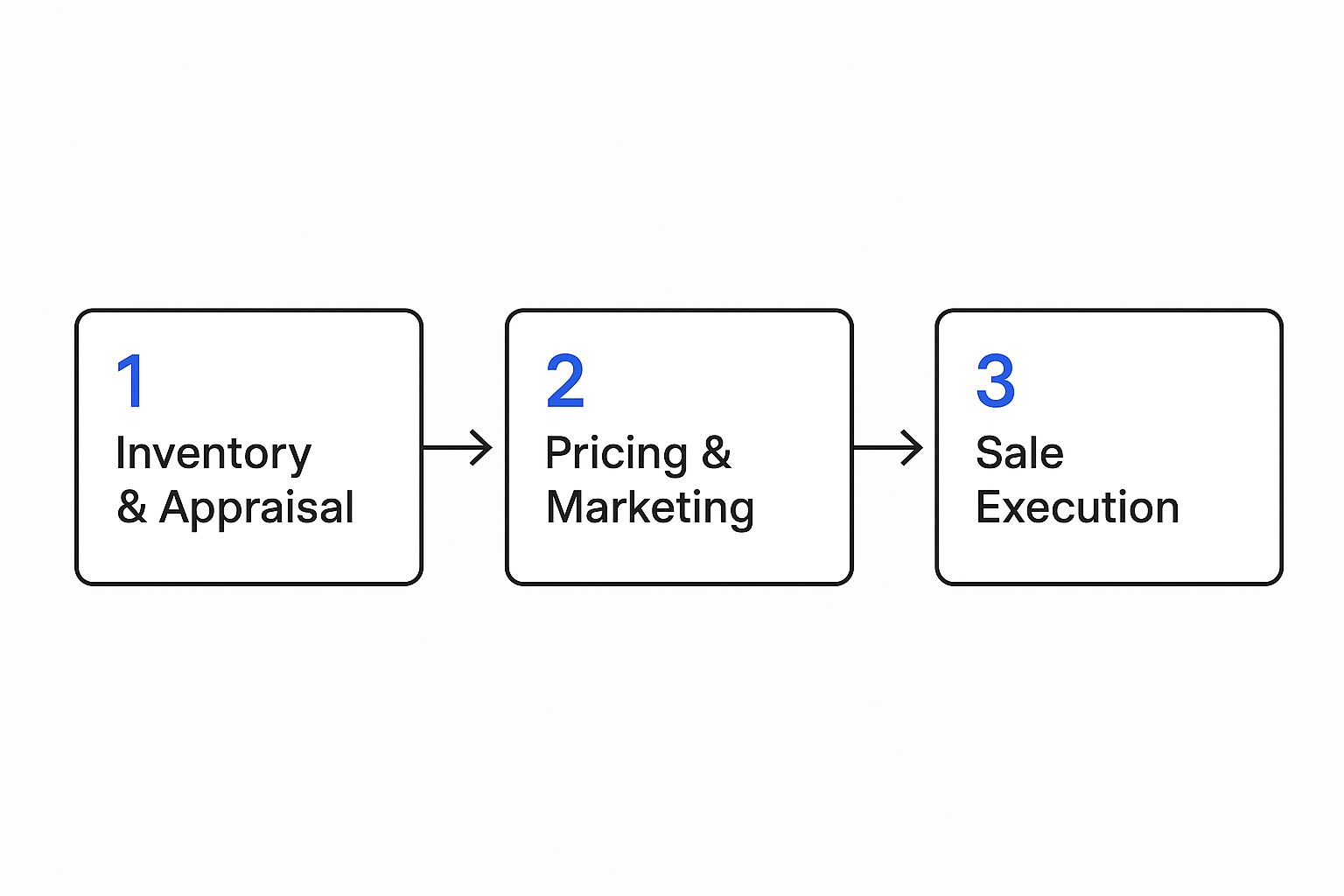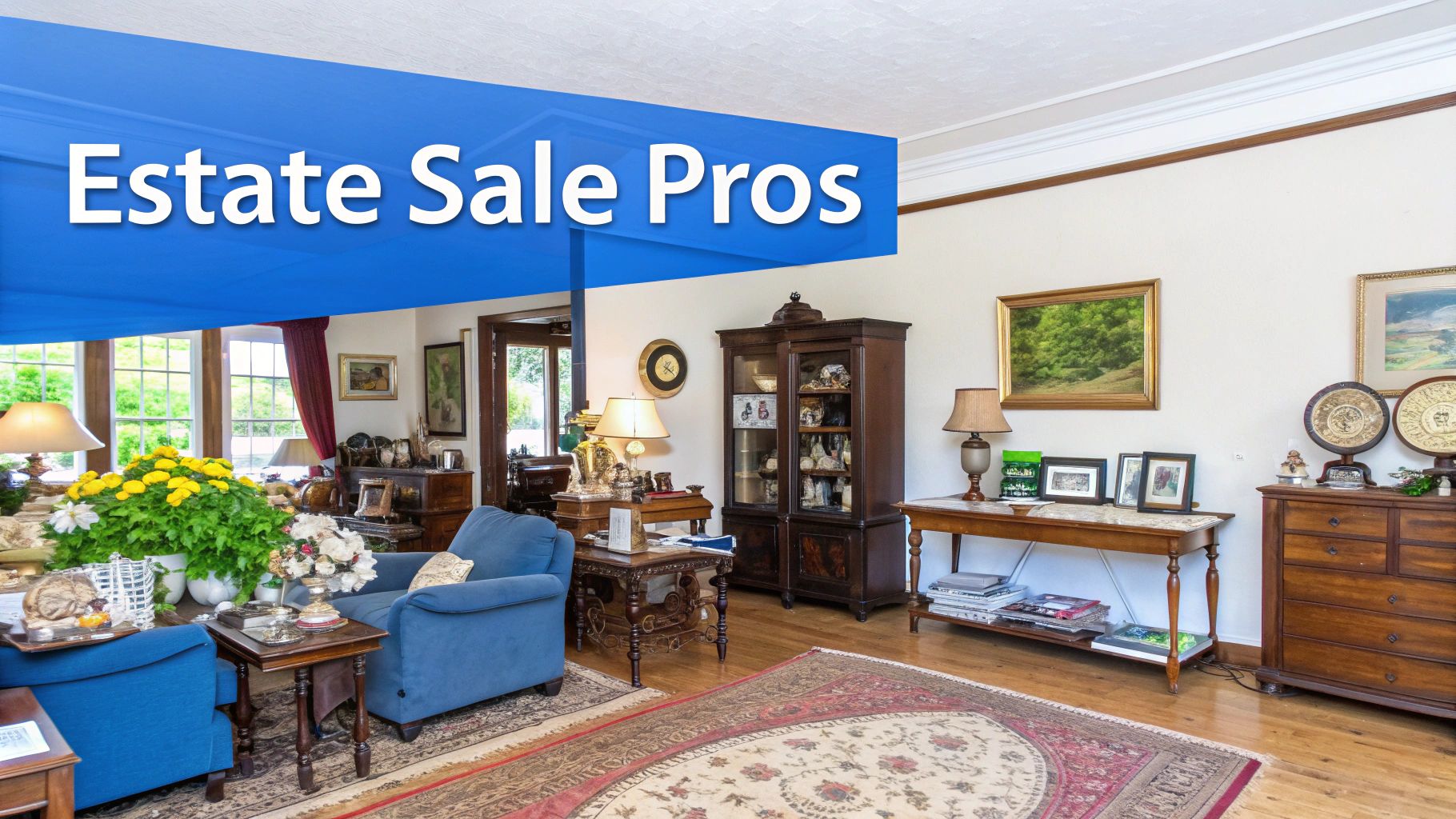Estate Sale vs Auction A Guide to Choosing

When it comes time to liquidate a home's contents, your first major decision is choosing between an estate sale and an auction. The two sound similar, but they operate in fundamentally different ways.
Think of an estate sale as a professionally run tag sale held inside the home. Everything has a price, and shoppers browse over a few days. An auction, on the other hand, is a fast-paced event where items are sold one by one to the highest bidder, often wrapping up in a single day.
Choosing Your Path: Estate Sale or Auction

Getting to the heart of how these two methods differ is the key to picking the right one for your situation. This choice really sets the stage for the entire liquidation, directly impacting how quickly you can clear the house, how much money you make, and how much hands-on effort is required.
Atmosphere and Buyer Interaction
An estate sale has a relaxed, almost retail-like feel. Shoppers are free to wander through the home at their own pace, pick up items, and decide what they want to buy at a set price. It’s a great fit for selling a large volume of everyday household goods—furniture, kitchenware, decor, and the like.
Auctions are all about energy and competition. This is where the estate sale vs auction comparison becomes crystal clear. The auctioneer and the structured bidding create a sense of excitement and urgency. That competitive dynamic can work wonders for unique, high-demand items, pushing their final sale price higher.
Pace and Timeline
The timeline is another huge differentiator. Estate sales are typically multi-day events, usually running over a weekend to give plenty of people a chance to stop by.
Auctions are built for speed. Most are concluded in a single day, with each item going up for bid and selling to the highest offer. This rapid-fire process can be a major advantage when you need to clear a property quickly. If you want to dive deeper into this comparison, AuctionsKC.com offers some great insights.
Key Takeaway: Go with an estate sale if you want a methodical, retail-style event to sell a wide variety of general items. Choose an auction when speed is a priority and you have valuable assets that would thrive in a competitive bidding environment.
To make things even clearer, here’s a quick side-by-side look at the core differences.
Estate Sale vs Auction At a Glance
The table below breaks down the fundamental characteristics of each liquidation method, from the format to the types of items they handle best.
| Feature | Estate Sale | Auction |
|---|---|---|
| Format | In-home, retail-style "tag sale" | Competitive bidding event (live or online) |
| Pricing | Items priced individually beforehand | Sold to the highest bidder |
| Duration | Typically 2-4 days | Often completed in a single day |
| Best For | General household goods, furniture, decor | Antiques, collectibles, art, high-value items |
Seeing them laid out like this really helps clarify which path might be a better fit for your specific needs and the types of items you're selling.
The Process from Start to Finish
Knowing what to expect from start to finish is essential when you're deciding between an estate sale and an auction. The journey from a full house to an empty one looks very different for each method, and those differences will directly impact your time, effort, and stress levels.
An estate sale kicks off with an in-home consultation. The company comes to you, walks through the property, and then gets to work inventorying and pricing every single item. This is a very hands-on process, where everything from the living room sofa to the last teacup gets a price tag. Nailing the right prices is a real art—price too high and nothing sells, too low and you leave money on the table. For a closer look at this balancing act, you can learn more about how to price estate sale items effectively.
The infographic below shows the basic steps that both methods share, from the initial evaluation to the final sale.

While the specifics vary, this gives you a good sense of the fundamental workflow. A professional approach is key at every stage, no matter which path you choose.
The Estate Sale Walkthrough
Once everything is priced, the company "stages" the home. They organize and display all the items to make the house feel like a pop-up retail shop. Then, they shift into marketing mode, using local online listings, email blasts, and signs around the neighborhood to draw in a crowd.
The sale itself is almost always a multi-day event, typically held over a weekend. The doors open to the public, and people browse and buy at their leisure.
Finally, there's the clean-out. Whatever is left unsold after the event gets handled based on your agreement. This could mean donating the items, having the company buy out the remainder, or simply disposing of it. This last step is what gets the house completely empty and ready for its next chapter.
The Auction Timeline
An auction moves on a much faster, more focused schedule. It all starts when you sign a consignment agreement with an auction house. From there, they’ll either move your items to their own gallery or prepare for an auction right there on your property.
Key Difference: With an auction, your items are organized into "lots" and then professionally photographed and described for a catalog. This catalog is the heart of the marketing effort, sent out to a curated list of collectors and serious buyers—often reaching a nationwide or even international audience.
The main event is the auction day itself. It’s a single, high-energy affair where bidding happens live or online, creating a competitive atmosphere that can really drive prices up. After the gavel falls, winning bidders have a very strict window to pay and collect their items. Because auctions typically have a very high sell-through rate, there’s often very little left to deal with afterward. For many people, that clean and decisive ending is one of the biggest draws.
Analyzing the Financial Outcomes

Let's get down to what matters most: the bottom line. When you're liquidating an estate, maximizing your financial return is almost always the top priority. Estate sales and auctions approach this goal from completely different angles, and understanding their financial models is the key to choosing the right path for your specific assets.
An estate sale company typically works on a straightforward commission. You can expect them to take a percentage of the total gross sales, usually somewhere between 30% and 50%. This fee isn't just for showing up—it covers their expertise in pricing, staging, marketing, and managing the entire multi-day event. It’s an all-inclusive service where their earnings are directly tied to how much they sell for you.
Auctions, on the other hand, often have a more layered financial structure. While the auction house also takes a seller's commission, they add another charge called a buyer's premium. This is an extra percentage, often 10% to 25%, that the winning bidder pays on top of the final price. This can sometimes lead to a lower commission for you, the seller, but you need to get this clarified right from the start.
Profit Potential for Different Asset Types
The real heart of the estate sale vs auction debate comes down to what you’re actually selling. An estate sale is built to generate steady, reliable revenue from a large volume of general household goods. It’s a fantastic way to efficiently sell everything from furniture and kitchenware to clothing and everyday décor at fair market value.
An auction truly shines when you have specific, high-demand items. The magic is in the competitive bidding environment, which is designed to drive up the price of unique assets like fine art, rare collectibles, antiques, or classic cars.
An auction creates a powerful combination of urgency and scarcity, pushing dedicated collectors or enthusiastic buyers to pay a premium. This is where an auction’s profit potential is unleashed—not by selling everything, but by maximizing the return on your most valuable pieces.
Think about it this way: a vintage designer handbag might get a decent price at an estate sale, but it could easily spark a bidding war at a specialized auction, leading to a much higher final sale. Conversely, a standard set of dinnerware is much better suited for the high-volume, steady foot traffic of a traditional estate sale. For a complete breakdown of what's included in these charges, our guide on understanding estate sale fees provides even more detail.
Factoring in Market Conditions
The market itself can also sway financial outcomes, especially for auctions. Timing is everything. Research has shown that auctions have grown in popularity, particularly when real estate markets are unpredictable. For example, during an oil-price slump in Dallas back in the mid-1980s, auctioned properties sold at discounts between 15% and 21%. But in a booming Los Angeles market during that same period, those discounts were almost nonexistent.
Ultimately, the best financial decision comes from a clear-eyed assessment of your inventory. A house filled with quality, standard items will likely bring a higher total return from a well-managed estate sale. But an estate with even a few standout, valuable assets will almost certainly earn more from the targeted marketing and competitive thrill of an auction.
Matching Your Assets to the Right Venue

Here’s where the rubber really meets the road. The single most important factor in the estate sale vs. auction debate is the stuff you’re actually selling. Not every item performs well in every environment, and matching your assets to the right sales channel is the key to getting the best possible return.
Think of an estate sale like casting a wide net. It’s designed to capture value from a huge range of everyday household items, attracting a large crowd of local buyers who are looking for good deals on quality secondhand goods.
An auction, on the other hand, is more like a spotlight. It’s built to zero in on your most valuable and unique pieces, creating a focused, competitive event for a targeted audience. This is where items with a specific collector base, brand name, or genuine rarity can reach their true market value.
When an Estate Sale Is the Ideal Choice
An estate sale thrives on volume and variety. It's the perfect approach when you're dealing with a home full of good-quality, functional items that aren't necessarily rare or collectible. This is how you get the best results for a broad mix of household belongings.
An estate sale is your best bet if your inventory is mostly made up of:
- Standard Furniture: Think sofas, dining sets, bedroom suites, and coffee tables.
- Kitchenware and Appliances: Complete dish sets, everyday gadgets, and major appliances.
- General Home Décor: Lamps, rugs, curtains, and wall art that isn't from a noted artist.
- Clothing and Linens: Everyday apparel, outerwear, towels, and bedding.
These are the things that make a house a home, and an estate sale creates a comfortable, retail-like atmosphere for shoppers to browse and buy. The goal isn't to get a record-breaking price on one item but to sell a high volume of goods to a diverse crowd over a single weekend.
A huge mistake people make is undervaluing everyday items. A good estate sale professional knows that things like cleaning supplies, unopened pantry items, and basic tools all add up. Never throw anything away before a consultation—you could be tossing out cash.
When an Auction Will Yield Better Results
An auction is, without a doubt, the way to go when you have specific items that will benefit from focused marketing and a competitive bidding war. This is how you connect high-value assets with serious buyers who know what they're looking for and are willing to pay a premium.
You should be leaning toward an auction if you need to sell:
- Fine Art and Antiques: Original paintings, sculptures, and authenticated antique furniture.
- Rare Collectibles: Signed memorabilia, vintage toy collections, stamps, or valuable coins.
- High-End Jewelry and Watches: Designer pieces, items with precious metals, and luxury timepieces from brands like Rolex or Patek Philippe.
- Specialized Assets: Classic cars, boats, firearms, or heavy-duty professional equipment.
For these kinds of items, an auction’s ability to reach a national or even a global market is a massive advantage. It creates an event around your best pieces, making sure they get the attention—and the price—they deserve. A professional auctioneer knows exactly how to identify, market, and sell these assets to a dedicated base of collectors and enthusiasts.
Deciding which channel fits which item can be tricky, so I've put together a simple table to help you visualize where different types of assets typically perform best.
Optimal Sales Channel by Asset Type
| Item Category | Best Channel | Reasoning |
|---|---|---|
| Everyday Furniture & Decor | Estate Sale | Attracts local buyers seeking functional items for their homes. Volume is key. |
| Kitchenware & Appliances | Estate Sale | High demand from homeowners, renters, and people starting out. Sells best in a "tag sale" setting. |
| Fine Art & Sculptures | Auction | Requires targeted marketing to collectors and art enthusiasts who understand the value and will bid competitively. |
| Rare Books & Manuscripts | Auction | A niche market that is best reached through specialized auction platforms with a global audience of collectors. |
| Jewelry & Luxury Watches | Auction | Authenticity and brand recognition drive prices up in a competitive bidding environment. Attracts serious investors. |
| General Clothing & Linens | Estate Sale | Shoppers can browse sizes and styles in person. These items sell in volume but rarely for high individual prices. |
| Collectible Coins & Stamps | Auction | Buyers are often specialists who rely on auction houses for verified, graded items and are willing to pay top dollar. |
| Classic Cars & Vehicles | Auction | Creates a high-energy event that attracts serious car enthusiasts and collectors, often resulting in premium prices. |
Ultimately, many estates contain a mix of these items. The real art is working with a professional who can help you develop a hybrid strategy—perhaps an auction for the top 5-10% of items and an estate sale for the rest—to ensure you’re not leaving any money on the table.
When an Auction Is the Better Choice
While estate sales are fantastic for clearing out a whole house of everyday goods, an auction brings some serious strategic muscle to the table in certain situations. Think of it as a calculated move, one that’s usually driven by the specific items you're selling, your timeline, and your goal to get the absolute best price through good old-fashioned competition.
If you’re dealing with more than just standard household contents, an auction might be your best bet. At their core, auctions are all about creating that exciting, competitive tension to drive prices up.
Maximizing Value for Unique Assets
When you have items that a dedicated collector would love to get their hands on, an auction is the undisputed champion. We're not just talking about everyday furniture here. Consider assets like:
- Fine Art and Antiques: An auction can attract a crowd that truly understands the value of original paintings, authenticated period furniture, or rare sculptures.
- Rare Collectibles: Things like signed sports memorabilia, first-edition books, valuable coin collections, or even vintage toys really shine when bidders compete.
- Luxury Goods: High-end jewelry, classic cars, and designer handbags need serious buyers who are ready to pay a premium for authenticated, high-quality items.
For these kinds of assets, the transparent, fast-paced bidding of an auction is far more effective than the static pricing of a traditional estate sale. The key difference in the estate sale vs auction debate for special items is that an auction creates a focused event, drawing in passionate buyers who will battle it out for ownership.
An auction leverages scarcity and desire to establish an item's true market value in real-time. It transforms a simple transaction into an event, often resulting in a final price that exceeds expectations.
Leveraging Global Reach and Technology
Another massive advantage is an auction’s power to reach far beyond your local neighborhood. Modern online auctions completely break down geographic barriers, connecting your items with a global pool of motivated buyers. This is a game-changer for niche collectibles that might have only a handful of interested people locally but huge demand across the country or even the world.
This digital shift is a big deal. The auction house market has seen incredible growth and is projected to reach a market size of around USD 55 billion by 2033, fueled almost entirely by online access. You can dive deeper into these trends with market research from Business Research Insights.
The Power of Speed and Certainty
Finally, auctions give you a fixed sale date and a clear, definite timeline. That certainty is priceless for executors who need to meet legal deadlines or for anyone who has to clear a property quickly before a real estate closing.
An auction delivers a clean, efficient conclusion. With high sell-through rates and strict pickup windows, the entire process gets wrapped up on a predictable schedule. Exploring the differences between DIY online auctions and traditional companies can show you just how much speed and control modern platforms put back in your hands.
So, Which One Is Right for You?
You've seen how estate sales and auctions work, so now it's time to decide. There’s no single "best" answer in the estate sale vs auction debate—the right choice comes down to what you need to accomplish. It really hinges on your goals, your timeline, and what kind of items you’re selling.
Start by asking yourself what matters most. Are you looking to clear out an entire house filled with standard furniture and everyday goods? Or is your main focus getting the highest possible price for a handful of truly valuable pieces? An estate sale is built for the first scenario, while an auction is designed for the second.
A Quick Checklist to Make the Call
Next, think about your schedule and how you feel about having the public in the home. An auction gives you a firm sale date and wraps things up quickly, usually in just one day. Post-sale, the home is clear. An estate sale, on the other hand, runs for a few days and brings hundreds of people through the property, which means more prep work beforehand and a bigger clean-out job afterward.
Finally, take one last, honest look at what you’re selling.
- Selling everything, from sofas to spoons? Go with an estate sale. It’s simply the most effective way to sell a large volume of general household goods, like furniture, kitchenware, and decor.
- Have a few standout treasures? Choose an auction. You need that competitive bidding environment to drive up the price for things like fine art, antiques, signed collectibles, or classic cars.
- A little bit of both? Don't be afraid to mix and match. A hybrid approach often works best. Run an estate sale for the bulk of the items and then consign your most valuable assets to a specialized auction house to maximize their value.
By thinking through these key points—your goals, timeline, and inventory—you can choose your path with confidence. It empowers you to find the right method and the right professional to get the job done.
Frequently Asked Questions
https://www.youtube.com/embed/KPyk0dgCkBY
Diving into the world of estate liquidation naturally brings up a lot of questions. As you weigh an estate sale vs. auction, you might wonder about combining them, what to do with leftovers, or which path will get your house cleared out the fastest. Let's tackle some of the most common questions we hear from sellers just like you.
Can I Use Both an Estate Sale and an Auction?
Absolutely, and in many cases, this hybrid approach is the smartest way to squeeze the most value out of an estate. Think of it as a two-step process.
First, you can run a traditional estate sale to sell the bulk of everyday household items—the furniture, kitchenware, and general decor. It’s a fantastic way to clear out a large volume of goods efficiently.
Then, for the few remaining high-value or niche items (like fine art, rare collectibles, or specialty equipment), you can consign them to an auction house. This strategy plays to the strengths of both methods: the broad-clearing power of a sale combined with the targeted, competitive bidding of an auction for your best pieces.
Pro Tip: When you're interviewing professionals, make sure to ask about their experience with hybrid models. A sharp company will know exactly how to identify which items belong at auction and can manage that entire consignment process for you.
What Happens to Unsold Items?
This is one of the biggest practical differences between the two. How leftover goods are handled really depends on the path you choose.
After an estate sale, your contract will spell out the next steps. Typically, you'll have a few options:
- A final buyout, where the estate sale company buys all remaining items for a single lump sum.
- Donation to a registered charity, which gets you a tax receipt and a clean conscience.
- Disposal of the last odds and ends for an additional clean-out fee.
Auctions, on the other hand, usually have a very high "sell-through" rate, meaning very few items are left. If a piece doesn't sell or fails to hit its reserve price, it's simply returned to you. At that point, you're free to relist it in another auction, try selling it privately, or just keep it.
Which Option Is Faster for Emptying a House?
Both methods are designed for speed, but an auction generally provides a quicker and more final resolution.
An auction is a one-and-done event. It happens on a fixed date, and winning bidders are held to a very short and strict timeline for pickup. There's no ambiguity.
An estate sale, while still fast, runs for two to four days. After that, the process of clearing out all the unsold goods—whether through buyout, donation, or disposal—can add more time to the calendar.
If your absolute top priority is getting the house completely empty by a non-negotiable deadline, an auction usually has the edge.